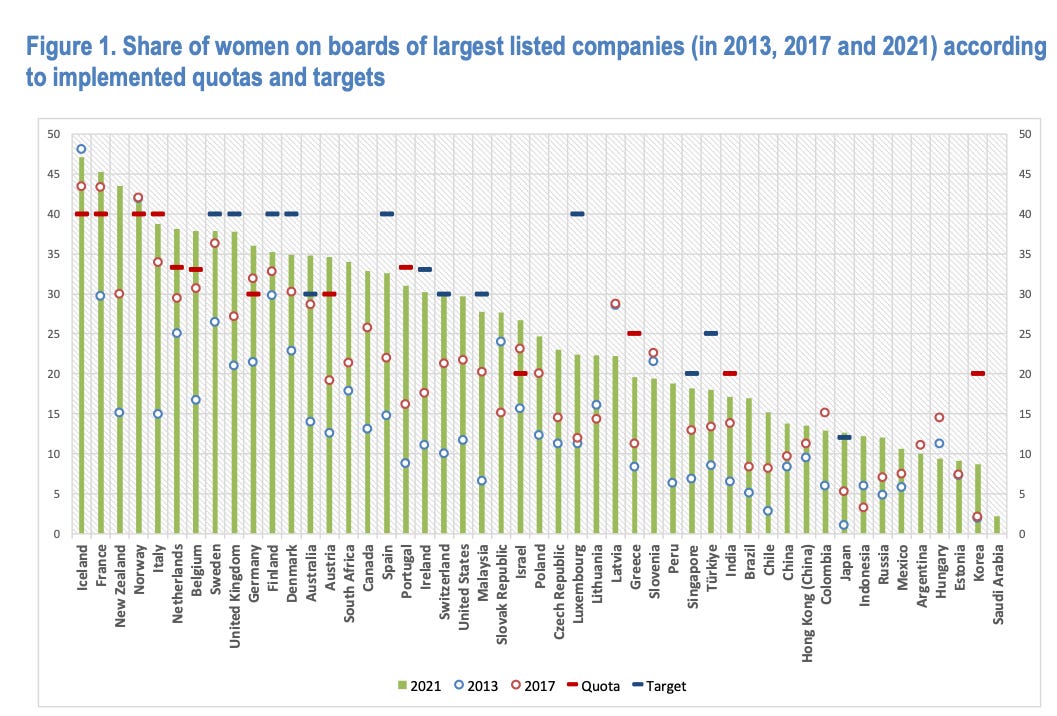Years ago, I saw this very funny Daily Show segment featuring a professor who argued that we need affirmative action for ugly people. As he is talking about the systemic discrimination this class is subjected to, the correspondent asks the researcher whether he knows this from first-hand experience. The professor responds that he is average, which elicits laughter from the correspondent and the crowd. The two of them end up walking around the University of Texas campus and rating women, for the purpose of achieving social justice of course.
The segment shows why identity politics for ugly people is not a realistic prospect. When it comes to race, sex, and sexual orientation, individuals tend to fall into discrete categories. Looks is a trait that exists on a spectrum, it is to a large extent subjective, and nobody wants to claim ugly as an identity.
Understanding this, I was surprised to learn that Korean antifeminists have something of a small penis movement. This has manifested in the “finger pinching conspiracy theory,” which holds that feminists in advertising and the media are sending coded messages mocking men who are poorly endowed.
This is not a fringe view in Korea. The Wikipedia page on the conspiracy lists dozens of controversies in which celebrities, corporations, and government agencies have issued apologies or explanations for supposedly mocking men’s small penises, spanning from 2021 to late 2024. The hysteria makes our Summer of Floyd look like a culture of measured restraint and thoughtful discourse by comparison. Here’s the ad that started it all.
In the years since, there have been controversies involving advertisements and promotional materials put out by companies including Starbucks, Volvo, and Kakao Bank. The National Police Agency and the War Memorial of Korea have also faced controversies.
Here is a pair of graphics released by the Ministry of National Defense on social media that it later apologized for.
Here’s another one from EMart, the largest retailer in Korea, announcing a promotional event.
In addition to looking at still advertisements, there’s apparently a practice of going frame by frame through video games and anime cartoons to find instances of finger-pinching.
Why is pinching seen as a way to mock men with small penises in the first place? Apparently this was the symbol of a feminist group called Megalia, which had this logo.
The organization spent part of the 2010s trolling misogynistic forums. There was a website called Megalian.com, but it tore itself apart over disputes regarding whether they should direct homophobic slurs at men. The website shut down in 2017. It doesn’t appear to have been that large, with a few hundred thousand unique visitors a month at its peak, compared to multiple male-focused forums that were in the millions at the time. Moreover, a substantial portion of Megalia’s traffic came from referrals from right-wing message boards and websites.
The finger-pinching conspiracy theory began in 2021. This means that there are substantial numbers of Korean men out there who believe that, four years after a mid-size feminist website shut down, its followers had infiltrated all sectors of Korean government and industry for the purpose of mocking men with small penises. Corporations and bureaucrats now all tremble in fear lest they put out into the world an actor or a cartoon that contorts its fingers in the wrong way.
The day after the sausage controversy started it all, a young man named Lee Jun-seok posted the ad, along with the corporate apology, on his Facebook page, calling for accountability for those responsible. This year, Lee ran for president and won 37% of men under 30, which was a plurality with that demographic. I guess just as how young conservatives in the US often have a history of posting racist content in their youth, their Korean equivalents grow up obsessing over insults to men with small penises.
This movement is particularly disturbing when you think about how the conspiracy must have begun and initially spread. Imagine being the first man on a forum to notice the secret messages out there and try to convince others that they exist. You are signalling that you take personal offense at reminders of having a small penis. Not only that, but you are so attuned to mockery of those who are poorly endowed that you discovered a conspiracy to denigrate them in hidden messages distributed through advertisements. Instead of laughing and calling you pathetic, other guys see this and share the conspiracy, at each step of the chain sending the same message out to the world in increasingly diluted form.
Like all political memes, conspiracy theories spread in part (more than in part?) because the individuals who share them are trying to tell you something about themselves. Think about QAnon. Adherents are hoping to signal that they’re loyal to Trump, they hate elites, and they hate pedophiles. We might say that conspiracies within a community are more likely to take off when sharing them signals individuals having traits that the community values. Consider even milder forms of conspiracy theories, things like “rent is high because landlords are greedy and corporations are collaborating.” You’re telling your fellow socialists that you’re compassionate towards renters and you hate successful businessmen, which makes sense given what this community believes.
Of course, this is why ugly people don’t get together and form conspiracy theories about the beautiful holding them back. I know we have incel forums where men sit around talking about how ugly they are, but they remain marginal here in the US and have zero direct real-world impact. This remains an exclusively internet phenomenon, as nobody wants to take up the cause in real life.
Having a small penis is more objective than ugliness since you can get out a ruler and measure, but this condition is usually hidden from the world, and if you do find yourself in that club, it’s best not to focus too much on it. Unsurprisingly, I’ve never heard of a small penis movement anywhere in the West.
In Korea, not only does this exist, but the movement is so strong that it has for years been able to bully around celebrities, major corporations and other institutions in a way that’s analogous to BLM and MeToo hysteria at the height of the Great Awokening. It’s difficult to think of a more searing indictment of a culture.
How Korean Antifeminism Is Different
As seen in the recent presidential vote, the finger-pinching controversy is part of a larger story of Korean antifeminism. It’s not just more widespread and intense than the antifeminism seen in the West, but also different in kind.
Antifeminism in the West leans into differences between the sexes. You have various branches, mainly traditional Christianity and Andrew Tate-style misogyny. If an American or European is strongly antifeminist, he often falls into one of these two camps. He may instead be a Quillette or Free Press reader and want equality in the classical liberal sense, but such a person usually isn’t neurotic or obsessive about their views. If he is angry about women, he’s probably a trad or a Tate fan.
My reading of Korean antifeminism is that it has even more rage than Tate fans and trads, but combines this with a stated ideology of equality. It therefore demands males and females be treated the same in ways few opponents of feminism would ever think to call for in the West. This involves being accepting of men becoming as hysterical and self-pitying as the most mentally ill women. While in the West we have some taboos against men being wimps or indulging too much in self-pity – complaining about your small penis is an extreme example of this – Korean men are more likely to walk around feeling sorry for themselves and accept others adopting a victimhood mentality.
In 2018, the Korean rapper Sam E released the song Feminist. It tells women that if they want to be equal, they should join the military and pay half of housing expenses. The song sparked a backlash, and Sam E tried to clarify that it was meant to be satirical. Regardless of the original intent of the artist, Feminism was taken to reflect actual arguments that Korean men make.
It seems that many Korean antifeminists don’t actually want that kind of equality, but bring up things like conscription in order to point out the hypocrisy and double standards of the other side. Yet I think in any cause there are arguments you can make that are true but you stay away from, as you don’t want to be misunderstood and change the nature of your movement. “Feminists are often very ugly women and that drives their political views” I suspect is a true statement, but any movement that stresses that point is going to attract the worst kinds of misogynists and repel decent people, so from the perspective of building an antifeminist movement it’s best not to go around talking like this.
Complaining that feminists don’t go far enough in their demands for equality is of a similar nature. You think you might be saying “why don’t you join the military if you want to be equal?” as a rhetorical device, but you’ll soon find yourselves with comrades who get off on the idea of tiny teenage girls falling over into ditches because they can’t carry their machine guns.
Both trads and Tate fans are trying to assert their masculinity by leaning into sex differences. The trad says men should be providers who protect and care for women. Tate tells you to use your physical strength and Machiavellian traits to get women to let you use them as sex objects. In contrast, rather than asserting their own masculinity, Korean antifeminists seem to have surrendered it in the process of fighting feminism. These men seem way too comfortable playing the role of the victim, with the finger-pinching conspiracy theory being this tendency taken to its most absurd state.
In the West, we have contempt for men who let themselves be bullied by women, even when women are unambiguously behaving in obnoxious ways. To imagine bizarre conspiracy theories about small penises and read them into supermarket advertisements reveals a victimhood mentality that is on a completely different level.
One may argue that the men who complain about this are just pointing to misandry and not exactly sending a message about their own anatomy. Yet you would think men would be so hesitant to even give the impression that they are mobilizing around their small penises that they would avoid spreading the conspiracy theory for that reason alone. And as with arguments about military conscription, you would think there would be hesitancy to notice finger-pinching in ads for the reason that it draws into your movement those passionate about having little dicks. In other words, even if the guys who spread the finger pinching conspiracy theory are not sending messages about the size of their own manhood, there’s still something wrong with a subculture that goes out of its way to express solidarity with those who would personally be offended by the messages allegedly being sent.
One of the great insights into identity politics is that, unless the oppression faced is unusually extreme, the cure is often worse than the disease. American blacks get affirmative action and deference regarding how other races speak about them, but their communities have many more pathologies than they did in the 1960s. Feminists, antifeminists, BLM activists, and nativists might all occasionally have decent points, but making perceived wrongs committed against your group central to your worldview tends to be culturally corrosive and a sign of poor mental health.
Symmetrical Paranoia
Korean antifeminism is sometimes portrayed as a reaction to feminism, yet all developed countries have some form of feminism, and the kind that exists in Korea appears to be if anything less successful and powerful than is the norm. For example, in 2020, Korea passed a law requiring public companies of a certain size to have one female board member. Contrast this to France, Iceland, Spain, the Netherlands, Italy and Norway, where 30%-40% of board members must be women. The US doesn’t have explicit quotas, but civil rights law has historically required them indirectly.
In terms of pure results, Korea is far from a feminist paradise, probably reflecting the state of the law. Its gender equity measures remain weak relative to practically all Western nations. It has the largest gender pay gap in the OECD, with women earning 31% less than men — nearly triple the average of around 11%. The Korean parliament is 19.1% female, putting it 39th out of 42 OECD countries. As of 2021, it comes in second to last place in women on corporate boards in a comparison of 49 middle- and high-income countries, only beating Saudi Arabia.
While Korean antifeminists often complain about feminists making themselves ugly, their country is world famous for its beauty products, and by some measures has the highest rate of plastic surgery in the world. A lot of press coverage is given to Korean women opting out of this culture and reducing their attractiveness by taking steps like cutting their hair short, but this particular brand of feminism, like gender quotas, is clearly much weaker in Korea than it is elsewhere.
The big difference with most of the West is probably conscription. Having to serve in the military for 18 months definitely puts men at a disadvantage in starting their lives. Yet this is the product of geopolitical realities; it’s not the fault of feminists. If Korean men don’t feel particularly threatened by Kim Jung Un, they can advocate against conscription, not demand that their women be ready to fight on the frontlines in the name of equality.
So yes, there may be legitimate complaints about Korean feminism. But men in every developed country have just as much to complain about on this front, if not more. And they have managed to face the forces of misandry with much greater dignity.
There seems to be a parallel here, in which Korean feminists often complain about violence against women. Meanwhile, if we turn our attention to empirical reality, Korea is one of the safest countries in the world. Our World in Data records a murder rate of 0.5 per 100,000, tenth lowest among nations for which we have relevant figures, and less than an order of magnitude of the number in the US. You even get stories in the Western press about how violence against women in Korea is responsible for its low birthrate.
So you have this symmetrical paranoia. Feminists in Korea believe they are in danger, despite living in one of the safest countries in the world. Antifeminists believe that they are suffering under an extreme form of misandry, when feminism as a movement is arguably weaker in Korea than it is in any other developed country. From this we may conclude that Koreans are unusually polarized around gender issues, with each sex taking an overly negative view towards the other.
Why Is This Happening?
I want to be careful talking about a foreign culture. There are maybe nuances and subtle parts of this story that I’m not getting, and I appreciate anyone filling me in on what I’m missing. But the outsider perspective helps too, making one able to put information in a greater context. And to me, the finger pinching conspiracy theory is the most disturbing psycho-social phenomenon I’ve ever heard of in a developed country.
I’ve always thought that liberals who believed that racism kept blacks poor and prone to committing crime were too parochial. All over the world, we see minorities that have suffered past and present discrimination who are nonetheless socioeconomically successful. If all you know is the situation in the United States, then the theory that historical discrimination leads to modern disparities seems plausible. If you look worldwide and take a comparative perspective, however, you find there is little empirical evidence to back this up. Sometimes discriminated against minorities are richer than average, sometimes poorer, and there are no easy and straightforward conclusions one can draw about causation.
Similarly, if all you know is South Korea, or focus too narrowly on that nation, its form of feminism may look extremely aggressive and vitriolic, and the men might seem really perverted and violent. From a broader perspective, these theories look ridiculous. Korean men are extremely non-violent and feminism in Korea is quite mild, while it is the male backlash to it that is unusual and needs explaining.
What then explains the sorry state of Korean antifeminism? Here, we can only speculate. First, note that East Asians everywhere are showing a tendency not to partner up and have kids, something I’ve attributed to high levels of neuroticism and conformity.
This means that many of the pathologies of Korea might be attributed to them just being East Asians under modern conditions. Korea, however, has the lowest birthrate of them all, if you exclude Hong Kong and Macau, which are just cities. So maybe a normal East Asian country in the era of iPhones has a TFR of 1.2, while Korea is at 0.8, and we can attribute the delta to Korea-specific factors. While that comes out to a delta of only 0.4 children per woman in terms of number of births, it is one-third less, which is a massive difference.
Based on rock bottom fertility rates and disturbing cultural issues, we can say that Koreans have the normal problems of East Asians, which the previous essay covered, but also unique factors that make gender relations there particularly awful. What might they be? Here we can only speculate. Allow me to put forward a few tentative theories.
Cultural role models: When I look at Korean antifeminism, it seems to me completely devoid of masculine virtues. Could this be due to a lack of cultural prototypes modeling masculinity? Westerners have a tradition that includes medieval knights, Nordic raiders, and the cowboy of the American West. Arabs have the Bedouin. Among East Asians, Japanese have the samurai, Mongolians have Genghis Khan. Are there any culturally-specific masculine prototypes that Koreans look to? I asked ChatGPT, and it told me about the seonbi, which it describes as a “virtuous scholar-gentleman,” and the “yangban warrior aristocrat.” People can tell me whether these prototypes incline men towards masculine virtues, or whether they’re as prominent in Korea as the models of other cultures.
Too much homogeneity: I like this article from Snowden Todd based on his experiences in Korea. He argues that healthy societies have multiple status hierarchies, so people can be more likely to find their place. In the US, you can try to be a rapper, a country music star, a MAGA influencer, a business executive, or whatever. Koreans, in contrast, all want to live in the same cities, have the same jobs, and compete for the same status symbols. The result is a horrifying rat race where there are many more losers than there would be in a more diverse society. Perhaps this leads some men to become particularly bitter, as reflected in the nature of Korean antifeminism?
One benefit of diversity is that it stops groups from spiraling into their worst pathologies. Asians growing up in America seem pretty normal in my experience, lacking many of the problems they have in their home countries. Some of this is probably a selection effect, but I suspect some of it isn’t. When I think about the small penis movement and men crying over girls being mean to them on the internet, I imagine that if they had an Urban American around he would go “Come on, dawg? You gonna let dem bitches get to you like that?” And then the Korean guy would snap out of his incel resentment and try to make something of his life.
Too much globalization: The homogeneity thesis would explain issues that all East Asians have, but it wouldn’t explain what makes Korea unique. Do Koreans perhaps have the opposite problem? Compared to China and Japan, Koreans have a higher rate of English proficiency, and are much more likely to study abroad. In 2021-2022, it was third among all Asian nations in per capita number of students studying in the US. Within Korean universities, a significant minority of classes are even taught in English, which is rarer than among its neighbors. The influence goes in the other direction too with the prominence of K-Pop.
So Koreans are geographically distant from the US and other racial groups, but mentally plugged into the global culture. They therefore import foreign ideas like feminism, without any of the antibodies that other cultures have to ward it off, which creates confusion and leads to a backlash. Westerners have dealt with women demanding equality for decades, in some ways for centuries – with all the tensions and logical inconsistencies such movements entail – and we have learned to keep things in perspective instead of being shocked into resentful hysteria every time some mentally ill feminist says something dumb on the internet. And because Koreans don’t have many minorities around, there’s nobody to stop the men from spiraling into self-pity and despair.
We therefore see in Korea the worst of all worlds, with its people suffering from both too much homogeneity and the pathologies of foreign influences they can’t handle.
Perhaps none of these theories is correct, and there are just random and idiosyncratic reasons why Korea went in such an unusual direction. Whatever it is, there appears to be something deeply wrong with Korean men. Anyone concerned about the future of that nation should focus on this problem, and let the small penis movement serve as a warning for those in other countries who think that nurturing right-wing oppositional cultures is the best way to fight back against the excesses of the Left.







As a Western male who speaks Korean, has lived in Korea, and is married to a Korean, I have puzzled over this topic at length and find your arguments quite persuasive--sometimes an outside perspective is useful!
I can also tell you that an obsession over penis size seems to be quite prevalent among Korean men: public bath houses / saunas (clean--no hanky-panky!) are common in Korea, and unlike in Scandinavia where no one gives a damn, some Korean men will visibly "check out" foreigners and even make comments about our genitalia (assuming we don't speak the language, natch). I've even been in conversations with groups of Korean men discussing black dudes' dicks. It's truly bizarre to me, and long pre-dates the finger-pinching movement--at least the 20 years that I've been in / around the country.
I have always thought that there is a glaring lack of traditional male role models; while Korean culture does have its share of masculine archetypes (warriors, generals, etc.), it venerates "scholars" (e.g., the yangban) to a much greater degree than even neighboring Asian countries.
And, while Korean pop culture certainly does have some traditional manly male stars, the vast majority are typified by the softbois / soybois of BTS, who look and present themselves as having taken a wrong turn on the way to a Harry Styles convention. Don't get me wrong, Bowie and Prince are awesome, and if eyeliner is your thing, you do you--but this archetype seems disproportionately represented in Korean pop culture. (And, to be clear, this pre-dates BTS, they've just turned it up to an 11.)
I will also say that violence against women short of murder remains quite prevalent in Korean culture, and is to an extent even normalized: Korean men "romantically" throwing women against walls or "passionately" hitting walls next to a woman is a recurring trope in Korean media.
Apart from that, domestic violence, revenge porn, spy cams, date rape, stalking, aggressive verbal assaults (not "you hurt my feelings" but screaming in women's faces to harass and intimidate), and violent threats are depressingly common--and while laws and enforcement have improved somewhat in recent years (which I think also contributes to some men's persecution complexes!), Korean police are generally apathetic about these things and make little effort to deter or punish them. Add to that fairly continuous, low-grade sexual harassment and stifling pressure to conform to a narrow feminine norm, and being a woman in Korea is often straight up no fun, yo.
Unfortunately, data on this type of lower grade violence is invariably hard to come by and low quality--but as the husband of an educated, professionally accomplished Korean woman, I can attest that it is very real, and one if not several orders of magnitude worse than what women in the U.S. or Western Europe (or even China or Japan) normally have to contend with.
I get what you're saying, and I don't think the argument you're making is wrong, but I want to pedantically make a small nitpick regarding the word "neuroticism" in the official context of psychological terminology.
In your original article on Asian breeding, you don't use the word neurotic, so I think the original article still stands. But you use it here, so I want to try to clarify and specify the use of these terms.
When you measure neuroticism at a national level, northwest European nations (France, Ireland, Britain) average a higher neuroticism score than Asian nations.
When you use the term "neurotic," I think what you actually mean is "highly agreeable and conscientious." In other words, someone who is a conformist.
Neuroticism is a bit different. Neuroticism is a heightened sense of negative affect, which is independent of the agreeableness and conscientiousness.
You can have someone who is disagreeable, lazy, criminal, and that person would be neurotic, but would definitely not fit the Asian stereotype you're describing.
The problem is that because of Jewish comedians like Woody Allen and Seinfeld, we've come to associate the term "neurotic" which someone who is studious, meek, a "beta male," which is not the actual definition. Violent criminals are often higher in neuroticism, while IQ is inversely correlated with neuroticism.
Links to data can be found here, if you find something contradicting this let me know:
https://deepleft.substack.com/p/leftism-as-ethnic-neotony